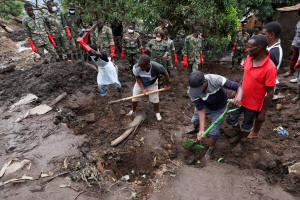Mass vaccination drive begins in Malawi after deadly storm
 Send a link to a friend
Send a link to a friend
 [May 15, 2023]
CAPE TOWN (Reuters) - Malawi on Monday kicked off a mass
vaccination drive to inoculate more than 9 million children against
several life-threatening diseases, as it seeks to prevent a health
crisis after deadly Cyclone Freddy. [May 15, 2023]
CAPE TOWN (Reuters) - Malawi on Monday kicked off a mass
vaccination drive to inoculate more than 9 million children against
several life-threatening diseases, as it seeks to prevent a health
crisis after deadly Cyclone Freddy.
The cyclone killed more than 1,000 people in the southern African
country, according to Malawi's president. It was one of the deadliest
storms to hit Africa in recent memory, ripping through Malawi,
Mozambique and Madagascar in late February and March.
The one-week nationwide vaccination drive will target children up to the
age of 15 and deliver vaccines against typhoid fever, measles, rubella
and polio, said partners including the World Health Organization,
UNICEF, and global vaccine alliance GAVI.
Children will also be offered a vitamin A supplement, the agencies said
in a joint statement, adding that immediately after the campaign the
typhoid vaccine will become routinely available in the country for
babies at health centres.
The campaign had already been planned before the storm, but is
especially critical in its aftermath since destruction and displacement
can increase the risk of diseases, they said.

"Malawi has demonstrated remarkable resilience in the aftermath of a
devastating cyclone," said Thabani Maphosa, managing director of country
programme delivery at GAVI, in a statement.
[to top of second column]
|

Members of the Malawian Army and locals
help the community to recover bodies of victims in Chimwankhunda
township in the aftermath of Tropical Cyclone Freddy in Blantyre,
Malawi, March 17, 2023. REUTERS/Esa Alexander/File Photo
 "Not only is it introducing a new
vaccine, which is never an easy task, it becomes one of the first
countries in the world to make the lifesaving typhoid conjugate
vaccine routinely available to children," he added.
Typhoid Fever, caused by a bacteria, is usually spread by ingesting
contaminated food or water and can be fatal. Natural disasters and
displacement increase the risk of typhoid outbreaks, said health
officials, especially in a country such as Malawi that has endemic
typhoid transmission.
"This is a significant step for Malawi," said Matshidiso Moeti, WHO
regional director for Africa.
(Reporting by Wendell Roelf; editing by Nellie Peyton and Bill
Berkrot)
[© 2023 Thomson Reuters. All rights
reserved.]This material may not be published,
broadcast, rewritten or redistributed.
Thompson Reuters is solely responsible for this content. |